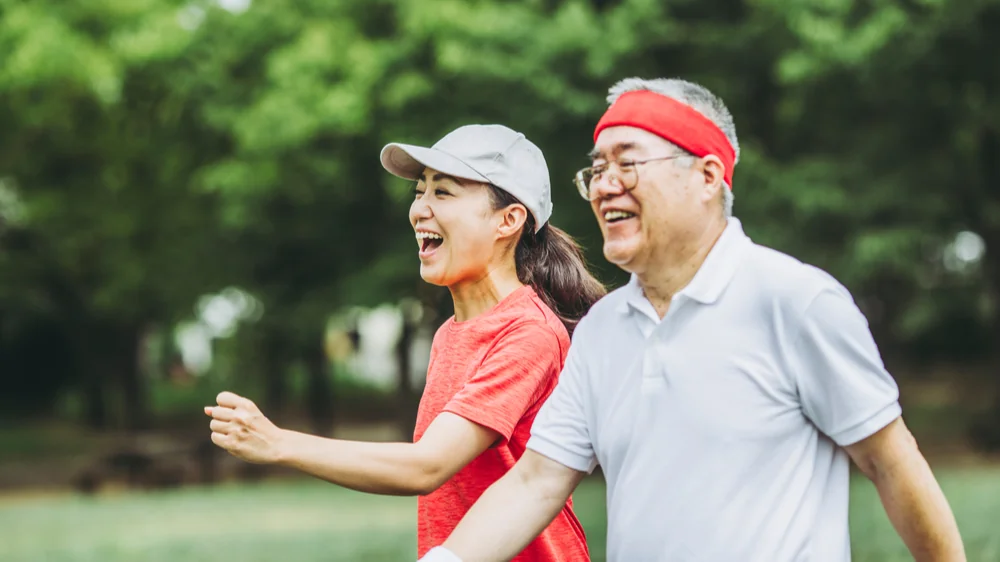In a new study published in International Journal of Environmental Research and Public Health, Japanese researchers have shown that astaxanthin supplementation improves endurance in healthy older adults [1].
Muscles succumb to oxidative stress
Aging leads to reduced muscle strength and endurance. Currently, exercising is the only method to slow down these processes, but it is often not feasible in older adults due to pain and other health issues.
On the molecular level, aging is accompanied by oxidative stress, which impairs energy metabolism and is connected with a decline in muscle strength. Therefore, taking antioxidant supplements in old age might be beneficial to offset muscle weakening and endurance decline, especially for people who can not perform continuous exercise.
In this study, the researchers focused on astaxanthin, as this antioxidant was previously shown to be effective at preventing age-related oxidative stress and mitochondrial dysfunction in muscles [2].
Astaxanthin is a member of the carotenoids, pigments that give the yellow, orange, and red colors to various foods. It is found in some algae and seafood, such as salmon, trout, and shrimp. Astaxanthin was previously shown to prevent muscle atrophy and increase endurance when combined with exercise [3].
Astaxanthin fights back
In order to explore if astaxanthin supplementation alone is effective at improving endurance in older adults, the researchers randomly assigned 24 healthy adults between the ages of 67 and 94 into an experimental group receiving 24 mg of astaxanthin and a control group receiving placebo for 16 weeks. The participants were living in nursing homes, which ensured that there was no variability in their diets. They were asked not to do any intense and unusual exercises throughout the trial.
First, the researchers conducted a reactive oxygen metabolites test and showed that astaxanthin supplementation reduced the participants’ oxidative stress. Next, the 6-minute walking test demonstrated that the participants from the astaxanthin group increased their walking distance. At the same time, astaxanthin supplementation did not improve muscle strength as shown by hand grip and knee extension tests.
In addition, the researchers measured the change in the participants’ lactic acid levels after the 6-minute walking test pre- and post-supplementation. Astaxanthin supplementation was shown to decrease lactic acid production in these participants.
Therefore, astaxanthin supplementation improved endurance by reducing oxidative stress, and lactic acid production was most likely decreased by inhibiting reactive oxygen species production and enhancing the activity of antioxidant enzymes.
Abstract
Oxidative stress is associated with deterioration of endurance and muscle strength, which are mostly accompanied by aging. Astaxanthin supplement has excellent antioxidant activity without any pro-oxidative properties. In this study, we investigated how astaxanthin supplementation affects walking endurance and muscle strength in nursing home residents. Healthy elderly individuals (age: 67 to 94) were divided into two groups: 13 subjects received a daily dose of 24 mg of astaxanthin for 16 weeks (astaxanthin group) and 11 subjects received a placebo (placebo group). These subjects were compared using body component measurements, serum d-ROM levels, the distance of 6-min walking, blood lactate levels after the 6-min walking test, and muscle strength. After supplementation, the levels of d-ROMs and blood lactate after the 6-min walking test in the astaxanthin group significantly decreased compared with the placebo group (p < 0.05). Additionally, the walking distance was significantly higher in the astaxanthin group than in the placebo group (p < 0.05), despite a significant reduction in lactate levels after 6-MWT (p < 0.05). However, no significant intergroup differences were observed in muscle mass and strength. Astaxanthin supplement for 16 weeks is effective to increase the endurance capacity of the elderly. Astaxanthin supplement suppresses d-ROMs at rest and lactic acid production after the 6-min walk test. In contrast, astaxanthin supplement did not show significant intergroup differences in the muscle mass and strength. Therefore, the effect was most likely accompanied by an increase in endurance instead of an increase in muscle strength.
Conclusion
This promising pilot study suggests a beneficial effect of taking astaxanthin supplements in older age, especially for people who do not engage in regular physical activity. The small size of the cohort along with the lack of individual response data limits the interpretability of these results. Nevertheless, it’s worth following up with future studies on astaxanthin supplementation in humans. Meanwhile, following a diet rich in vegetables and fruit along with low-intensity exercises is a proven way to keep oxidative stress down.
Literature
[1] Nakanishi, R., Kanazashi, M., Tanaka, M., Tanaka, M., & Fujino, H. (2022). Impacts of Astaxanthin Supplementation on Walking Capacity by Reducing Oxidative Stress in Nursing Home Residents. International Journal of Environmental Research and Public Health, 19(20), 13492.
[2] Mocchegiani, E., Costarelli, L., Giacconi, R., Malavolta, M., Basso, A., Piacenza, F., … & Monti, D. (2014). Vitamin E–gene interactions in aging and inflammatory age-related diseases: Implications for treatment. A systematic review. Ageing research reviews, 14, 81-101.[3] Liu, S. Z., Valencia, A. P., VanDoren, M. P., Shankland, E. G., Roshanravan, B., Conley, K. E., & Marcinek, D. J. (2021). Astaxanthin supplementation enhances metabolic adaptation with aerobic training in the elderly. Physiological reports, 9(11), e14887.





